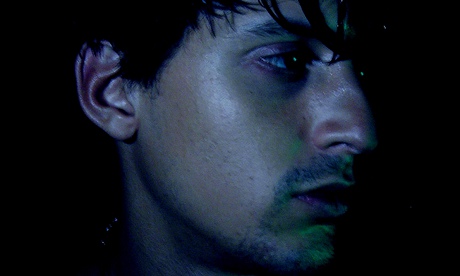
Music’s mainstream has always fed off underground currents, but lately the exchange of ideas has been more flood than trickle, particularly in the sensuous body of water that encompasses hip-hop and R&B. Canadian chart rapper Drake co-opted the then emerging London beat auteur Jamie xx for the title track of his 2011 album Take Care. Since then, this swirling of waters built to a tidal surge with Kanye West’s Yeezus album (2013).
Yeezus found West calling in an army of collaborators, including some of the most out-there electronic guys going: Evian Christ, Hudson Mohawke and Alejandro Ghersi, aka Arca. Challenging and multifaceted, Yeezus was crafted in a medieval-style artist’s atelier where West had various digital auteurs expanding on his ideas and pitching their own, much like the old masters had apprentices.
Twenty-four-year-old Venezuelan New Yorker Arca came to West’s ears thanks to a series of EPs he released in 2012. You might classify Arca’s Stretch 1 and 2 EPs as hip-hop, but this was hip-hop derailed by mischievous digital tomfoolery: avant-garde time signatures and warped pitches, a kind of post-millennial take on trip-hop with a debt to Aphex Twin. Arca did beats for all sorts of other people too. He provided queer rapper Mykki Blanco terrifying dystopian soundbeds for songs like Join My Militia.
Since then, Arca’s ascent has been dizzying. He’s worked with Kelela, one of the pioneering outriders of glitchy, penumbral soul’n’B. He co-produced FKA twigs’s EP2 – adding spacious intensity to songs such as Water Me – and Lights On from her Mercury-nominated LP1. Now based in London, he’s co-producing Björk’s next album, which is a bit like winning the electronic musician’s double (Kanye and Björk).
Arca’s own debut album, Xen, comes roughly a year after &&&&&, a free mixtape that bounced dizzyingly between urban harshness and increasing symphonic elegance; comparisons between the two works are inevitable. Xen finds Arca moving subtly away from the disoriented breakbeats and vocal samples that grounded his work in hip-hop. Even though there are many vestigial hip-hop elements, Xen feels like new ground. Piano keys open Held Apart. Halfway through the title track, a sad sweetness creeps in. It’s immediately stamped on by angry machines but wriggles through nonetheless. By Sad Bitch, we’re in the realm of tonal composition, in Family Violence, string arpeggios, far from Arca’s previous digital posturing, although speed and aggression survive on Bullet Chained. Failed is becalmed, contemplative, sorrowful. Promise is the deft closer, with harp sounds tumbling down from a height.
It helps to know that when Ghersi was growing up gay in Venezuela, Xen was a childhood alter ego he used as a refuge. Xen is often rendered as an alarmingly post-human female by Arca’s longtime visual collaborator Jesse Kanda, whose disturbing distortions of the female form were also put to arresting effect in videos for FKA twigs. That’s Xen CGI-twerking in the NSFW video for Thievery, as close as this chromatic record comes to dance music. That’s Xen on the cover of the album. The two collaborators met on the internet when they were 14, and now live together in east London (but not in the romantic sense).
In the press release for Xen, Arca is at pains to express how this is a record about between-states, the discomfort, excitement and unintended consequences when opposites rub up against each other. It’s one of those albums that elegantly restates the appeal of digital music, expressing hues and states of being that fall outside the analogue spectrum.

